Our Services
Wisdom Teeth
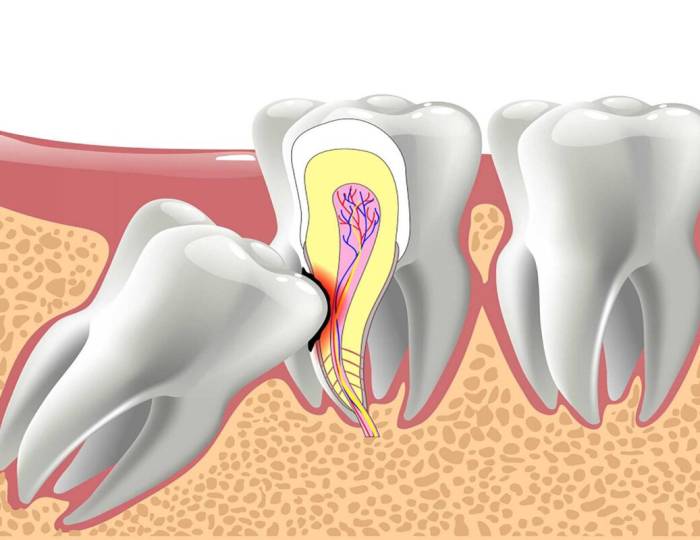
The impacted teeth can cause severe problems hence they are recommended to be taken out by an Oral & Maxillofacial Surgeon.
It is usually the lower wisdom teeth that are the cause for problems. However upper wisdom teeth can bite down onto the lower gums. Therefore, both the upper and lower wisdom teeth are usually removed.
The removal of wisdom teeth is a common procedure and should be done as soon as possible before any problems get worse.
It is best to remove wisdom teeth whilst a person is young. Young person’s tooth roots have not completely formed and the bone around the teeth is softer.
Therefore, removal of wisdom teeth is much easier with fewer complications.
- There is not enough room for the tooth to push through
- You need orthodontic work and the your orthodontist requires space to align your other teeth by removing the wisdom teeth
- The tooth has started to cause problems and should be removed before any further damage occurs
- As the wisdom tooth develops, its roots will grow closer to the nerve of the jaw, therefore increasing the risk of injury to the nerve if the tooth were to be removed later
- Protection of adjacent teeth from the impacted wisdom teeth
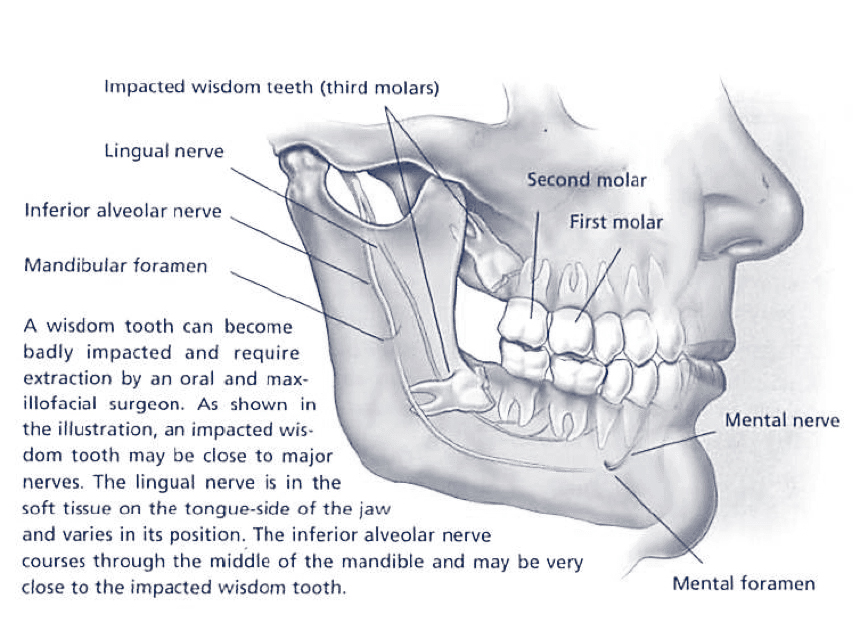
Some Problems Wisdom Teeth Can Cause
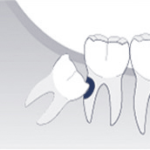
Erosion Cavity
When the wisdom tooth hits the neighbouring molar, it can cause infection.
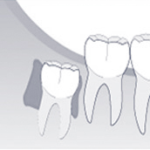
Cysts
Cysts can destroy the bone and damage other teeth. Cyst formation is uncommon.
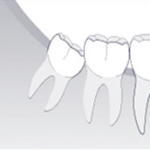
Crowding
Crowding occurs when the wisdom tooth pushes hard against other teeth causing crowding.
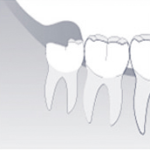
Infection
When an impacted wisdom tooth pushes through the gum, an infection can form around the top of the bone.
Surgery
Your surgeon will take a detailed medical and dental history. It is important to fully disclose your history to ensure the best quality of care.
Your surgeon will discuss with you whether it is best to have your tooth removed under Local Anaesthetic (“in the chair”) or General Anaesthetic in hospital (“asleep”).
To remove the wisdom tooth, a small incision is made on your gum to access the wisdom tooth. A small amount of bone around the tooth may need to be removed. The tooth may need to be divided into smaller segment to allow it to be removed easily and safely. The incision is then closed with dissolvable stitches.
Pre-operative Preparation
If you are having a general anaesthetic, the hospital will contact you a few days prior advising you of the time you need to arrive at the hospital and specific fasting instructions. The anaesthetist will also contact you regarding your medical history and preparation for anaesthesia.
Smoking
You should attempt to stop smoking for at least 2 weeks prior to surgery.
Mouthrinse
You should rinse your mouth with an antiseptic mouth rinse starting 3 days prior to your surgery. An appropriate mouthrinse should have active ingredients such as 0.5% Chlorhexidine. The same rinse can be used after surgery.
Possible Complications of Wisdom Tooth Surgery
It is not possible to outline every possible complication of wisdom tooth surgery. However it is important that you have enough information to weigh up the risks and benefits of the surgery.The following complications are list to inform you however not to alarm you. Please feel free to discuss this with your surgeon.
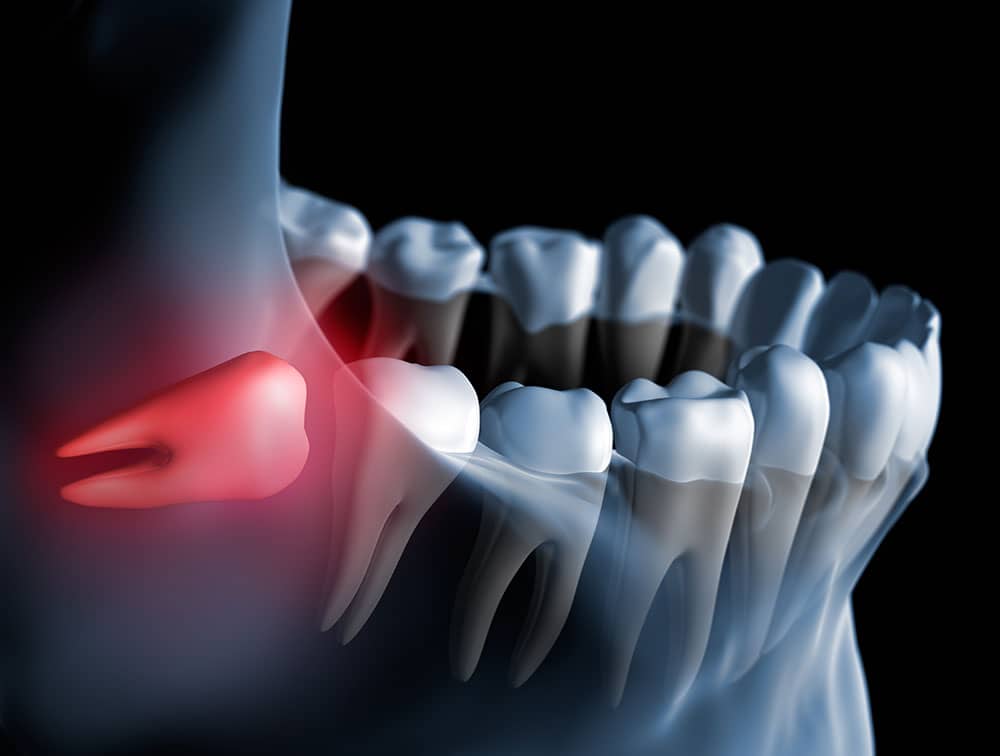
An impacted wisdom tooth can be close to 2 major nerves that provide feeling and sensation to the lower lip, gums and tip of the tongue. When a wisdom tooth is removed the nerves can become bruised. On a very small number of occasions the nerve can be injured. If an injury occurs, the result may be numbness, tingling, “pins and needles” and rarely pain to the lower lip, gums, teeth and tongue. The injury usually heals and may take up to twelve months. Movement and position of the lips and tongue will not be affected.
Numbness of the lips and tongue may be a major factor that affects some people’s work or daily life. If this may be the case, please discuss this with your surgeon prior to surgery.
In a very small number of cases, nerve damage may heal poorly resulting in persisting pain. This can happen despite successful surgery and despite all care taken to prevent nerve injury. It is not known why this occurs in some people. Pain in these cases may need to be treated by long term medications and involvement of pain specialists. Please note, this is a rare phenomenon.
As with any surgery, there is a small chance of infection. Infection is treated with antibiotics. Very rarely and infection may need to be washed out if the antibiotic is not effective.
Difficulty in opening mouth (“Trismus”).
Difficulty in opening your mouth as a result of pain or trismus is normal. Thus usually improves with one to two weeks.
Your body temperature will be elevated for one or two days after surgery. This is a normal response to surgery. A fever arising a few days after surgery may be an indication of infection. If you notice this, please contact your surgeon.
Slight ooze or spots of blood are expected in the first day or two. Excessive bleeding is rare. If you are concerned fold and place a piece of gauze at the site of surgery and bite on it for 30 minutes. DO NOT remove the gauze pack during this time.
Whilst your tooth is being removed, pressure or stretch of your lips may be required. This may result in a bruise or small sores. These will heal without any issues. Lip sores are rare.
Damage to adjacent teeth or filling.
When your tooth is being removed, part of the adjacent tooth or filling may be chipped or loosened. This is rare.
When upper teeth are close to the sinuses an opening between the sinus and the mouth may occur following removal of the tooth. If the opening is large, your surgeon will fix this at the time of surgery. This usually heals without any issues. Occasionally a further procedure may be needed to close this opening.
After the removal of any tooth, the clot that forms over the bone can dissolve or wash away. This is termed dry socket. If this occurs, it results in a constant, throbbing pain lasting for a week or more. If you have such pain, contact your surgeon.
To help minimise the chance of dry socket:
Do not smoke until the surgical site has completely healed
Do not rinse your mouth in the first 24 hours
After the first 24 hours, rinse your mouth gently with the recommended mouth rinse
Try and keep the rest of your teeth as clean as possible. Be gentle around the area of surgery
What To Expect
After Surgery
You will have a post-operative appointment made for you to check on your progress. All patients have different recovery rates and different levels of pain tolerance.
The following information is a guide to your expected recovery.
If you have any concerns, please feel free to call OMS Specialists.
- Please organise someone to drive you home from hospital
- Rest from normal activities for 5 days
- Return to work approximately 1 week following your procedure
- Refrain from strenuous activities such as sports or exercise for 2 weeks
- DO NOT operate any heavy machinery or drive any vehicles for at least 72 hours after anaesthetic or if you are on sedative medications
Avoid foods that are too hot or too cold within the first 24 hours
Soft diet is recommended in the first 7-10 days
Make sure you drink plenty of fluids whilst you are on a soft diet. We recommend at least 2 litres of fluid per day
Your surgeon will advise you on the medications you have been prescribed
Any antibiotics prescribed should be taken until the course is completed
Analgesics (pain-killers) should be taken regularly for 5 days as per the instructions
Post-operative pain is expected with any surgery
Pain usually starts after 24 hours and peaks at 5-7 days after
Pain should start to subside after 10 days
Take analgesics (pain-killers) as prescribed
Slight red ooze is normal in the first 2 days
If you are concerned, fold and place a piece of gauze at the site of surgery and bite on it for 30 minutes. DO NOT remove the gauze pack during this time.
Rest lying flat with your head elevated
Place an icepack or ice wrapped in a towel over the side of your jaw
If the bleeding does not stop after 2-3 hours, please contact the clinic
DO NOT rinse your mouth in the first 24 hours
Rinse your mouth with the advised mouth rinse for 2-3 weeks
Brush your other teeth GENTLY and as best as possible
Ice packs held against the jaw and changed every 15 min for the first 12 hours can reduce swelling
Post-operative swelling (oedema) is expected after surgery
It usually peaks after 3 days and will gradually subside over the following 10 days
Restricted mouth opening (trismus) is expected for 2 weeks
After this period, we encourage mouth opening
It is normal to experience numbness to the lips, cheek, tongue and cheek
Take care not to bite your lips and tongue whilst still numb, especially in the first 24 hours
This should improve after 2 weeks
Stitches (sutures) used will dissolve unless advised by your surgeon
These usually dissolve in 3-4 weeks but may vary between patients
In case of any difficulty breathing, uncontrolled bleeding or any other emergency make your way immediately to your local hospital emergency department (ed).

